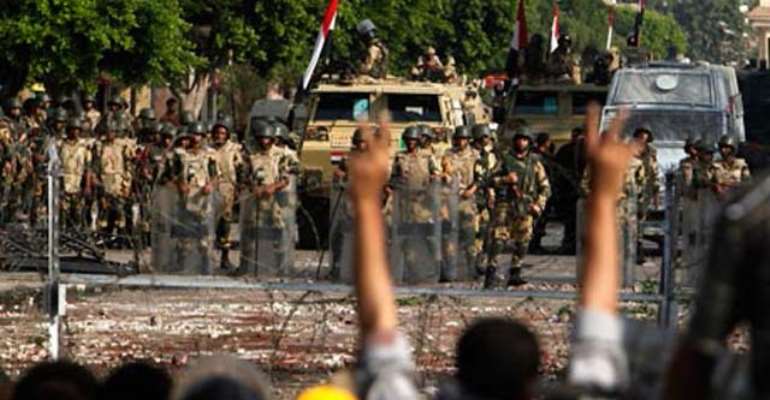42 Morsi supporters killed in Cairo

Soldiers stand guard near the Republican Guard headquarters in Cairo. Photograph: Asmaa Waguih/Reuters
Egypt‘s crisis plumbed new depths on Monday after 42 supporters of Mohamed Morsi were killed by government security forces in Cairo, triggering a call by the Muslim Brotherhood for an uprising to restore the deposed president to power.
The country’s single bloodiest incident of recent times took place outside a Republican Guard club in the capital where Morsi is rumoured to be in detention. The Brotherhood condemned what it called a massacre. The army said “terrorists” had attempted to storm the heavily guarded building. The Egyptian health ministry said 322 people had been injured.
Amid moves to open an independent investigation into the killings, injured victims described how the shooting began at around 4am, hours after rival mass demonstrations for and against Morsi in Cairo and across the country.
“There were dawn prayers and then I heard someone calling for help,” Mohamed Saber el-Sebaei told the Guardian. “Just before we finished, the shooting started. The army units that were standing in front of the Republican Guard headquarters first started shooting teargas, then live ammunition above people’s heads.
“People started to fall back and then an armoured vehicle came round the right-hand side escorted by a group of soldiers with their rifles shooting directly into the people. I was taking cover behind some rubble and I felt something hit my head.”
Early claims that there were children among the dead were not confirmed. A doctor in charge of a field hospital said the three hours he had spent treating casualties were some of the worst he had experienced in his life. Abdel Aziz Abdel Shokor, another injured man, described hearing an army officer saying “don’t shoot, don’t shoot” before he was gunned down.
The army said an “armed terrorist group” attempted to break into the Republican Guard headquarters and attacked security forces. One officer died and 40 soldiers were injured, seven of whom were in a critical condition, according to al-Ahram, Egypt’s leading pro-government newspaper. The army said it had arrested at least 200 people who had large quantities of firearms, ammunition and Molotov cocktails.
Morsi was deposed by the Egyptian military last Wednesday after protests led by the Tamarod (Rebellion) movement calling for his removal. Adli Mansour, the head of the high constitutional court, replaced him as interim president on Thursday. Morsi supporters condemned this as a military coup. Opponents portray it as a continuation of the revolution that overthrew Hosni Mubarak in 2011.
The conservative Salafi Noor party withdrew from talks about a transitional government after the latest violence. “We wanted to avoid bloodshed, but now blood has been spilled. So now we want to announce that we will end all negotiations with the new authorities,” it said.
Abdel-Moneim Abul-Fotouh, a moderate Islamist who left the Brotherhood last year, called on Mansour to step down and told al-Jazeera that the incident was “a horrible crime against humanity and all Egyptians.”
The Brotherhood’s Freedom and Justice party said it was calling “on the great Egyptian people to rise up against those who want to steal their revolution with tanks and armoured vehicles, even over the dead bodies of the people.” But a spokesman clarified later that the appeal was for a “peaceful uprising”.
Saad Amara, a senior FJP figure, compared the killings to Israeli attacks on Palestinians in Gaza and said they had been carried out by “armed criminals”.
Hamdeen Sabahi, a former presidential candidate and leftist opposition leader, said: “It is very bad news. Very painful. The troops have the duty to guard this building and deal with any attackers. But the result puts us in a bad situation.” The only beneficiaries were the Muslim Brotherhood and others who sought to polarise the situation and drive Egypt into civil war, he said.
Published before the incident, the main headline in Monday’s edition of al-Ahram was about the army warning against violence and pledging to protect peaceful protests.
The US is understood to be trying to defuse the crisis by brokering an agreement between the Brotherhood and the military, but there seems no chance that Morsi will be restored or that the defence minister, General Abdel-Fatah al-Sisi, will resign, as the Islamists are reportedly demanding.
Britain’s foreign secretary, William Hague, said: “It is crucial that there is a swift return to democratic processes in Egypt. All sides of the political spectrum should work together for the sake of the country’s political and economic future.
“It is for the Egyptian people to chart a way forward. However, in our view this should include a path to free and fair elections in which all parties can compete, the release of political leaders and journalists, and work to agree a constitution and the checks and balances of a democratic system that respects the rights of all Egypt’s citizens. Urgent steps to improve economic conditions in the country are also vital.”
